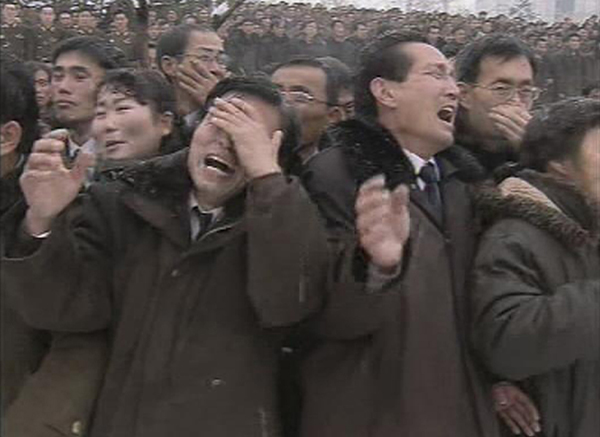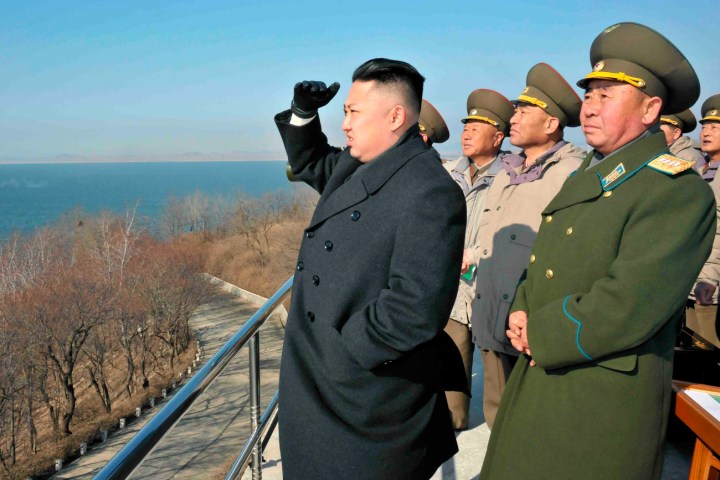US President Obama spent part of the weekend using a pair of high-powered binoculars to peer at North Korea from the safety of its southern neighbour. REBECCA DAVIS takes a look at what he might have seen.
There is perhaps no place on this earth which is so closed and mysterious to outsiders as North Korea. The scenes last December after the death of dictator Kim Jong-il, when footage of North Koreans engaging in outbursts of hysterical public grief were sent around the world, epitomised this sense of a culture which seems unknowable. One of the strangest aspects of North Korea’s position in the global understanding is that the country appears to have come to occupy quite a comic role. The late Kim Jong-il was the subject of countless satirical blogs, such as the wildly popular Tumblr site called Kim Jong-il Looking at Things, a compendium of photographs of the late leader doing exactly what it says on the tin. Jong-il was also lampooned by Western media for his fondness for platform shoes and Elton John-style sunglasses.
But in reality, there’s little that’s funny about North Korea and its leaders. These days, you can even visit North Korea yourself as a tourist – unless you’re a journalist, in which case, forget it. Your visa application may be helped by the fact that South Africa and North Korea maintain diplomatic relations, and let’s not forget that North Korea gave support to the ANC during the struggle. The ANC Youth League, at least, maintains gratitude for this historical aid – after the death of Jong-il last year, the League released a statement calling on North Korea to press on with “unifying their country, to free it completely of the legacy of colonialism left to its people by imperialists represented by the United States of America”. Youth League representatives also attended a conference in the capital Pyongyang in 2010, after which spokesman Floyd Shivambu said: “We support North Korea unapologetically. We have never said anything except declaring support for North Korea”.
The Youth Leaguers would not have seen much outside of Pyongyang. Visitors to the country have to be accompanied by minders at all times, and only see what the regime wants them to see. Pyongyang is the show city, as unrepresentative of the wider country as the set of The Truman Show. In Pyongyang, the roadside grass is reportedly cut with scissors, and pavements are washed clean by hand, with cloths. Anyone old or sick or disfigured is shipped off to the province in regular cleanses. There are sparkling high-rise buildings and, of course, endless statues to commemorate the dynasty launched by Kim Il-Sung, North Korea’s first leader. If you are not prepared to bow in front of statues and place wreaths of flowers when instructed to by your minders, North Korea probably isn’t the holiday place for you.
In recent years North Korea has become less isolated than it once was: capitalism is encroaching. The Economist reported last year that at the annual Pyongyang Spring International Trade Fair, North Koreans are now given an opportunity to buy a limited range of imported goods, like kitchen appliances, duvets and iPods (though the latter aren’t much use, since downloading is illegal). At the fair, the tiny proportion of North Koreans with cash to spend snap up these exotic imports. They are the lucky ones, sufficiently close to power to gain access to more resources. For other North Koreans, their access to food is often determined simply by their levels of devotion to the state: for perceived disloyalty, the punishment may be the removal of food.
Things are better in North Korea in this regard than in the 90s, when famine (or as the state calls it, the Arduous March) claimed the lives of as many as 3.5-million people. Last year’s harsh winter hit harvests badly, however, and it’s essential that grain stores remain stocked in this year above all others. 2012 is the centenary of the birth of Kim Il-Sung, the year in which it is predicted that North Korea will become “strong and prosperous”. Pyongyang has therefore turned to its old foe, Washington: it was announced at the end of February that the USA will give 240,000 tons of food to North Korea for the first time since 2009.
It will be interesting to see whether these bags carry the condition that the US implemented in 1997: a label on each one with the phrase “Gift of the people of the United States” in Korean. The US introduced this measure as an attempt to introduce some non-state authorised information to a country almost entirely deprived of it. All radios and TVs sold have only the state broadcasters pre-programmed on them, and must be registered with the police. Anyone who illegally picks up broadcasting from China or South Korea faces serious penalties. Internet is available to the elite, but it amounts to a kind of nation-wide “intranet”, with only access to a few state-endorsed websites granted. The kind of “news” which North Koreans are exposed to is simply a stream of propaganda and misinformation, in which North Korea is portrayed as a hugely significant and respected figure in global politics and the country’s leaders as revered worldwide.
As an illustration, the state news agency – Korean Central News Agency – was, at the time of writing, running stories on its website like Birth Anniversary of Kim Il Sung Commemorated in Switzerland, Bulgaria and Korean People Display Their Will to Hold Kim Jong Il in High Esteem Forever. For most North Koreans, this is the only information they will ever receive about their country. The USA’s intention in labelling their food source as originating in the US is hoped to inspire questioning – if America is as evil as their leaders make out, why are they sending us food? And why do we need their food when our entire national ideology is built on Kim Il-Sung’s notion of “Juche”, or self-reliance? It is reported, however, that when North Koreans ask about the bags’ labels, they are told that the food aid is part of America’s reparations to North Korea for having started the Korean War of 1950. (In reality, Kim Il-Sung led a Stalin-supported invasion of South Korea.) This claim – that the US started the Korean War – is one of the fundaments of North Korean propaganda.
The food aid now looks to be in jeopardy. One condition of its granting was that North Korea would suspend nuclear missile tests and uranium enrichment. Pyongyang has announced, however, that it will launch a long-range rocket mounted with a satellite next month as part of the celebrations around the Kim Il-Sung centenary. North Korean officials say this is a harmless test of their satellite capabilities, and “part of our right to develop space programmes”, to quote the country’s top nuclear negotiator, Ri Yong-ho. The US, South Korea and Japan are not impressed, especially as it comes soon after the North Korean military having threatened a “merciless sacred war” against South Korea. They suspect that this is a test of North Korea’s long-range nuclear potential, and fear that they may be developing a missile which could carry a warhead as far as Hawaii or Alaska.
US President Barack Obama was in Seoul this weekend in the run-up to this week’s nuclear summit, where he issued some forthright observations about North Korea. In reference to the uncertain position of new leader Kim Jong-Un, Obama said: “It is not clear exactly who is calling the shots and what their long-term objectives are”. Then he mounted an observation post to look over the heavily militarised border post separating North and South Korea, the DMZ (Korean Demilitarised Zone) using binoculars. Obama said that what he had seen amounted to a “time warp”.
The last major US political figure to visit Pyongyang was Madeleine Albright in 2000. One of the difficulties about political engagement with North Korea is that it is very hard to tell what the situation is like on the ground. Writing for the Global Post in December last year, Emily Lodish commented: “If there’s one thing experts on North Korea can agree upon, it’s that we don’t know anything about what’s going on in North Korea”. Valuable sources of information in recent years have been defectors from North Korea, with the most high profile of these being Hwang Jang-Yop, the ideological adviser to Kim Jong-il who was responsible for the formulation of the theory of “Juche”. Jang-Yop defected in 1997 by walking into the South Korean embassy in Beijing while in China on diplomatic business, an action that was thought to be such a security risk that police sealed off the building immediately.

Photo: North Koreans react during their late leader Kim Jong-il’s funeral procession in Pyongyang. REUTERS/KRT via Reuters TV.
In taking this action, Jang-Yop was condemning the family he left behind to instant imprisonment. In North Korea the notion of “collective family responsibility” prevails, whereby if one member of a family is deemed to have misbehaved, the entire family is punished. The number of North Koreans currently held prisoner in labour camps is estimated to be anywhere between 150,000 and 200,000. One of the biggest camps, the Guardian reports, is bigger than the city of Los Angeles. The camps have two areas: the first, “revolutionary zones”, are reserved for those who have committed a less serious offence, like illegal border-crossing. They may stay in the camp for a few months to a decade, and receive tuition into the teachings of Kim Jong-il and Kim Il-Sung in “re-education” zones. The second type of area, “complete control districts”, is where serious offenders go. In complete control districts, those individuals considered “irredeemable” simply work to death.
A book to be published this week tells the story of the camps in horrifying detail. Escape from Camp 14, by Blaine Harden, tells the story of a man who goes by the name Shin Dong-hyuk, thought to be one of the only people ever to escape from a North Korean labour camp. Dong-hyuk was born in the camp, where guards arrange marriages for prisoners who have behaved well. You have the option to reject your partner, but then you never get another chance at a match. When the guards bring the two together, they may spend five nights together, and thereafter see each other once or twice a year. Dong-hyuk was conceived in the camp because his father had been the brother of two men who had fled south during the Korean War.
Because his only life experiences were in the camp, Dong-hyuk knew almost nothing about the outside world. He did not know of the existence of the capital, Pyongyang. He did not know that the earth was round, and had never heard of the concept of money. Growing up in an atmosphere of routine violence and torture (his first memory was of an execution), he himself became desensitised, knowing nothing else. In a fit of pique over his mother reserving rice rations for his brother, he told a prison guard about his mother and brother’s plans to escape. They were summarily executed. They deserved it, he thought.
Dong-hyuk managed to escape his camp with the aid of an older, worldlier prisoner who suggested they flee to China. This other prisoner died during their escape, fried to death on the camp’s electric fence, but Dong-hyuk made it by dint of stealing a soldier’s uniform and crossing the border in disguise. In late January 2005 he reached China, and from there moved to South Korea and eventually the USA. He was extraordinarily lucky. One can only imagine the culture shock he must have found the modern world to be. North Koreans who defect to South Korea are given classes to teach them the truth about the world and North Korea’s place in it.
Another high-profile escape from North Korea was that of Shin Sang-ok, a renowned movie director from South Korea, who was kidnapped with his wife in 1978 and made to make propaganda films for Kim Jong-il. Sang-ok and his wife managed to escape almost a decade later while shooting in Vienna, but in the interim they had won a place in Kim Jong-il’s inner circle, with the late dictator treating them as his confidants. When they escaped, they took secret recordings they had made of Kim Jong-il. In the tapes, he openly admits to the failing of the state and its socialist principles, and acknowledges that the population lacks enterprise and motivation. Perhaps this is the most chilling aspect of the North Korean regime: although from the outside it seems like a crackpot dictatorship run by a madman, actually the dynasty started by Kim Il-Sung has acted completely rationally throughout, in that their guiding motivation has been to stay in power.
What will be the outcome of this latest sabre-rattling from Pyongyang? The US has warned that it will retaliate if North Korea goes ahead with their satellite launch. But the country is highly likely to press on, because the launch represents propaganda gold and will be milked for all its worth. As always with North Korea, it’s hard to know what the right response would be. The US is aware that they are dealing with a country with uncertain nuclear capabilities, a grotesquely inflated sense of self and 11,000 pieces of artillery pointed straight at the citizens of South Korea. There’s not much to laugh at there. DM
Read more:
- US President peers into North Korea, on Voice of America.
- How one man escaped from a North Korean prison camp, in The Guardian.
Photo: North Korean leader Kim Jong-Un inspects a combined strike drill of the three services of the Korean People’s Army in an undisclosed location. REUTERS/KCNA.







 Become an Insider
Become an Insider